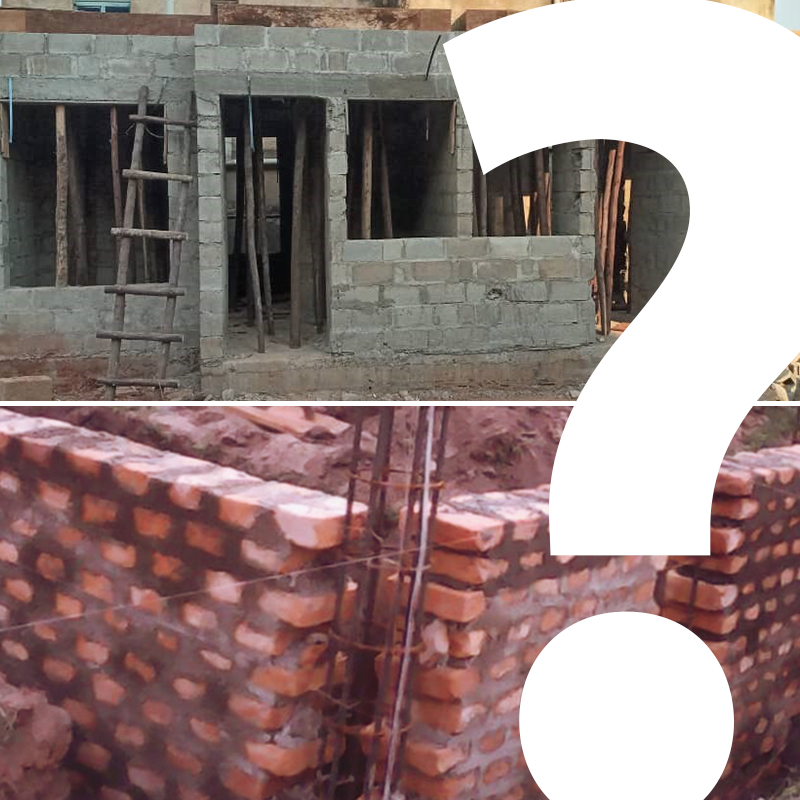Masonry accounts for a large portion of the typical construction project, therefore the importance of your choice of material cannot be overstated. In Uganda, clay bricks and concrete blocks are the most frequently used masonry media.
“Should I use bricks or blocks?”
Ideally, this question should be considered during the Design phase of your construction project. This owes to the fact that your choice of materials will often have an effect on your building’s structural design, and vice versa.
However, more often than not in Uganda, this question is considered after project construction has already begun. The consequences of this reversed order can be dire.
From decades of experience in construction, here are some guidelines to help you make your choice as you plan your next project.
Bricks In The Foundation, Blocks Above
Fired clay bricks can withstand chemical corrosion and water-logged conditions more effectively than concrete blocks. These clay bricks are also less brittle, making it harder for cracks to travel through them, up the building, compared to concrete blocks. So when it comes to your foundation, you’ll be better off using fired clay bricks, and reserve the blocks for above-ground masonry.
Bricks & Solid Blocks Carry More Load
Hollow blocks are more fragile and cannot bear as much load as clay bricks and solid blocks.
For instance, you might want to erect a water tank but will find a problem with hollow block walls because they are thin and easily compromised. Heavy loads like water tanks will be safer carried by walls of clay bricks or solid concrete blocks.
Hollow Blocks Ease Piping & Wiring
After the foundation, you will proceed to erecting walls. Then having put up the walls, at one point, you will need to bore into some walls to create pathways for electrical wires and water pipes. If you used hollow blocks, it is easier because they have holes that are easy to seal after pipe and wire installation. This is much easier done compared to when you are creating wire or pipe pathways in a brick or solid block wall.
Blocks Are More Accurate & Aesthetic Even Without Plastering
You can get away with not plastering a properly built block wall. The same cannot always be said about a brick wall. This is owed to the more proportional and consistent shape and size of concrete blocks that allows for a flush finish of masonry work. The more varied shapes and sizes of clay bricks makes it hard to get that flush finish on your wall. Even with good quality masonry, you will most likely be better off plastering your brick wall unless, of course, you’ll opt for much more costly fair-faced brickwork.
Brickwork Isn’t Necessarily Cheaper Than Blockwork
Big surprise, right?
But it’s true.
Brickwork generally seems cheaper than blockwork, mostly due to the price per piece:
A brick costs about UGX300-500. A block will cost about UGX2500-3000.
However, when you take into account the larger area covered by a block compared to a brick, the final figures aren’t worlds apart. For the same area of masonry, the cost outlay will not be too different.
Perhaps other factors will influence your decision, for example: If you plan to plaster your wall, it will generally cost you more money to finish a brick wall because a thicker layer of plaster will be needed to cover all the blemishes that come with clay bricks. Finishing a block wall will cost you less, because only a thin layer of plaster will be needed to cover it up.
Blockwork Is Faster
The average brick measures close to 8 inches. The average concrete block measures close to 15 inches.
Keeping all necessary factors constant, it takes about half the time to build a block wall than it takes to build a brick wall of the same dimensions.
Those are potentially major time and financial savings to consider, especially if the labourers on your construction project are paid per day.
Conclusion
- When all is said and done, deal with professionals during your construction project.
They will safely guide you through such decisions on masonry units, and the many more decisions that will need to be made throughout the progression of your project.
Many of the people called “Site Engineers” do not have the required qualifications or they just learnt on the job.
Century Investors can provide you the professionalism and experience on which you can build your investment with peace of mind. Get in touch here. - A building must be constructed as per the structural design specifications. A sound structural design will be reviewed and approved by your town’s authorities.
If in the process of construction some design changes need to be made, a professional engineer will work with you to ensure they are made safely, in accordance with the law, and with no compromise to the structural integrity of your building. - Lastly, purchase your building materials from genuine manufacturers who have a reputation to protect. They will hardly ever sell sub-standard materials because they are aware of the consequences.



